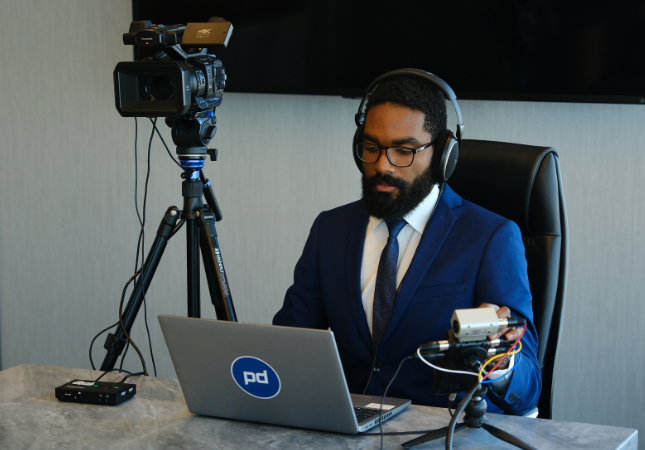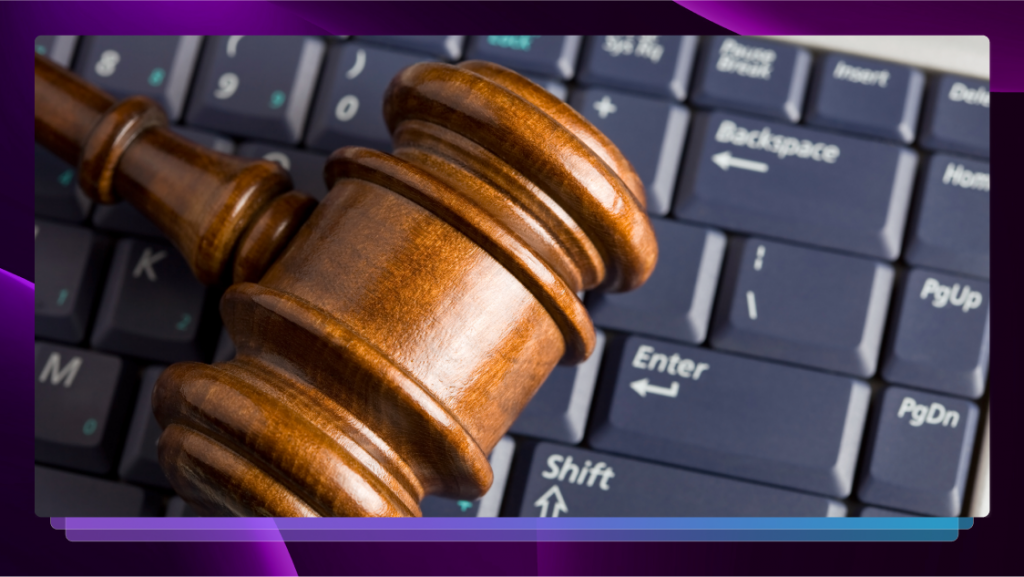Breaking down the essential elements of legal video depositions for legal professionals
Wiki Article
The Significance of Legal Video Clip Depositions in Modern Legal Providers: What You Ought to Know
Legal video depositions have actually become essential in today's lawful landscape. They offer a multidimensional sight of witness statements that typical transcripts just can not match. By catching both spoken and non-verbal communication, these depositions boost the total understanding of a witness's credibility. Nevertheless, the efficiency of video depositions pivots on numerous aspects, including conformity with lawful criteria and ideal methods (legal video depositions). Checking out these elements exposes their true importance in modern legal servicesWhat Are Lawful Video Clip Depositions?
Legal video clip depositions act as an important device in the lawsuits procedure. They entail videotaping witness statements in a video style, capturing both non-verbal and verbal communication. This approach allows attorneys to record the behavior, expressions, and responses of witnesses, providing a richer context for the statement. Usually conducted in a controlled setting, these depositions are led by attorneys who ask concerns while a stenotype reporter documents the discussion. The resulting video clip can be important for trial preparation, as it allows attorneys to assess the credibility of witnesses and improve their approaches. In addition, lawful video depositions can be utilized in various legal contexts, varying from civil conflicts to criminal cases. The acoustic and aesthetic components of video clip depositions improve the discussion of proof, making it an essential component in the modern legal landscape. Generally, they add considerably to the efficiency and effectiveness of legal procedures.
Benefits of Video Depositions Over Conventional Approaches
Video depositions use numerous advantages compared to conventional approaches of taking witness testimonies. One considerable advantage is the capacity to record both audio and aesthetic elements, offering a much more detailed document of the witness's declarations. This double style improves quality and permits lawyers to reference certain subtleties throughout test preparation. Furthermore, video depositions assist in remote engagement, making it much easier for witnesses that may be unavailable for in-person appearances due to geographical constraints or health and wellness issues.Moreover, video clip depositions can accelerate the total deposition procedure, reducing the time and expenses connected with traveling and logistics. They additionally improve access, as recorded depositions can be quickly shared among lawful groups and referenced at any moment. This benefit contributes to much better situation administration and preparation. In general, video clip depositions represent a modern-day, efficient approach to collecting witness statements, aligning with the advancing demands of the lawful profession.The Function of Body Movement and Tone in Testimonies

In lawful video depositions, body movement and tone play important duties in sharing a witness's reliability and dependability. Nonverbal hints can offer insights right into a witness's emotion, affecting how their testament is perceived. Comprehending the impact of these aspects is essential for jurors and lawyers alike when evaluating the integrity of a testimony.
Nonverbal Interaction Insights
While spoken communication is frequently highlighted in legal statements, nonverbal signs such as body movement and tone play a crucial function in sharing credibility and emotion. Viewers of depositions might note that a witness's posture, motions, and faces can considerably influence perceptions of dependability. Constant eye get in touch with might signal self-confidence, while avoiding stare could recommend dishonesty or pain. The tone of voice-- its pace, quantity, and pitch-- can give sensations of genuineness or unpredictability. Lawyers should be in harmony with these nonverbal signals, as they frequently offer essential context that enhances talked words. Understanding these subtleties can enhance the performance of depositions and affect the end result of lawful procedures.Psychological Tone Effect
The psychological tone conveyed throughout lawful statements considerably influences how a witness is perceived. Body language, singing inflections, and facial expressions play vital roles in shaping the story of a testimony. A witness displaying confidence via consistent eye get in touch with and a tranquil tone can infuse a feeling of reliability and interaction. Alternatively, indications of anxiousness, such as fidgeting or an unsteady voice, might result in uncertainty regarding their account. The subtleties of emotional expression can affect the interpretation of truths, making it crucial for legal experts to identify these signs. In video clip depositions, the auditory and aesthetic parts combine, highlighting the relevance of emotional tone in sharing sincerity and reliability within the legal procedure.Trustworthiness and Credibility
A crucial consider establishing trustworthiness and dependability throughout statements lies in the witness's body movement and intonation. Viewers often count on non-verbal cues-- such as eye get in touch with, pose, and motions-- to examine a witness's sincerity. As an example, a witness who keeps eye contact and presents open body movement might be viewed as more trusted and truthful than one that prevents eye contact or shows up shut off. Furthermore, intonation plays an important role; a constant, calm tone can reinforce the credibility of the testimony, while variations in pitch or volume may elevate doubts. Eventually, the mix of body language and vocal tone greatly affects just browse around this web-site how a witness's declarations are obtained and translated in a legal context.Ideal Practices for Performing Video Depositions
Conducting video depositions requires cautious preparation and implementation to guarantee a clear and reliable discussion of testament. It is important to pick a silent, well-lit place to lessen distractions and safe optimum video clip quality. The equipment should be examined in advance, consisting of electronic cameras, microphones, and lights, to prevent technological issues during the deposition.Next, celebrations included must review the layout and procedures ahead of time, making certain that everyone comprehends their functions. The deponent must be briefed on the process, including exactly how to react clearly and concisely.Additionally, preserving a professional disposition throughout the session is crucial. This consists of avoiding speaking over each other and verifying that all inquiries are directed properly. Finally, it is crucial to record the deposition in a style that permits for simple playback and testimonial, preserving the honesty of the testimony for future usage.Lawful Considerations and Conformity Issues
Exactly how do legal considerations and compliance problems influence the efficiency of video clip depositions? Attorneys have to browse a complex landscape of laws, guaranteeing that video depositions adhere to administrative guidelines and requirements. Compliance with laws concerning privacy, approval, and taping techniques is crucial. Obtaining explicit approval from all celebrations included is needed to stay clear of legal repercussions.Additionally, the admissibility of video clip proof in court can pivot on conformity with step-by-step needs. Guaranteeing that the devices made use of fulfills technical criteria is also essential, as inadequate high quality can undermine the deposition's reliability.Moreover, lawyers have to recognize any kind of certain state legislations that control video clip depositions, as these can vary substantially. Failing to resolve these considerations can not just endanger the stability of the deposition but additionally impact the total case approach, ultimately affecting the client's lawful end results.Exactly How Video Depositions Influence Court Perception
While video depositions can work as effective tools in lawful procedures, their impact on court understanding is substantial. The aesthetic and acoustic components of video recordings offer jurors with a more detailed understanding of witness behavior, trustworthiness, and emotional reactions. This multimedia approach can boost the jurors' capability to evaluate the reliability of testament contrasted to standard text-based transcripts.Moreover, video clip depositions permit jurors to observe body language, tone of voice, and facial expressions, all of which can affect their analysis of the witness's declarations. The visibility of a witness on screen can humanize them, cultivating compassion and connection, which may persuade jurors' viewpoints. Conversely, a witness that appears untrustworthy or evasive on video clip might cause unfavorable assumptions that influence a court's choice. Ultimately, the vibrant nature of video depositions plays a vital duty fit just how jurors translate evidence and reach their decisions.The Future of Video Depositions in Legal Practice
As advancements in technology continue to reshape the legal landscape, the future of video clip depositions is poised for significant advancement. Technologies such as synthetic intelligence, virtual reality, and enhanced video conferencing tools are expected to improve the deposition process and improve access. Lawyers might make use of AI-driven analytics to examine witness trustworthiness and instance stamina much more effectively.Moreover, the integration of virtual truth might allow courts to experience immersive simulations of depositions, providing deeper context and understanding. Additionally, the pattern toward remote depositions is likely to persist, supplying greater adaptability for customers and lawyers alike.As remote work ends up being progressively normalized, video clip depositions will likely end up being conventional practice, reducing prices and time restraints associated with typical techniques. On the whole, these technical improvements assure to boost the effectiveness, effectiveness, and availability of video depositions in lawful technique, eventually changing how attorneys prepare for test.Regularly Asked Inquiries
Just How Much Do Lawful Video Clip Depositions Usually Expense?

Can Video Clip Depositions Be Utilized in Any Sort Of Case?
Video depositions can be used in different sorts of instances, consisting of civil, criminal, and family law. Their adaptability permits lawyers to existing witness testaments properly, adjusting to the details needs of various legal situations.What Equipment Is Needed for a Video Clip Deposition?
To perform a video clip deposition, necessary tools includes a top notch video camera, microphone, lights, and a trustworthy recording device. In addition, a computer with editing software application may be needed for post-production and formatting the final video.For how long Does a Typical Video Deposition Last?
A common video deposition lasts between 2 to four hours, relying on the intricacy of the instance and the number of concerns posed. have a peek here Extended sessions might happen, yet breaks are generally incorporated important link for individual comfort.

Are Video Clip Depositions Admissible in Court?
Video clip depositions are generally permissible in court, provided they stick to legal criteria and guidelines of evidence. Their use enhances quality and preserves witness statement, assisting in the judicial procedure during hearings and tests. Legal video clip depositions have actually come to be vital in today's lawful landscape. Furthermore, legal video clip depositions can be used in numerous legal contexts, varying from civil disagreements to criminal instances. Additionally, video clip depositions help with remote engagement, making it easier for witnesses that might be not available for in-person appearances due to geographical restraints or wellness issues.Moreover, video clip depositions can expedite the overall deposition procedure, lowering the time and prices linked with traveling and logistics. Making sure that the equipment used meets technological standards is additionally vital, as inadequate top quality can threaten the deposition's reliability.Moreover, attorneys must be conscious of any type of particular state regulations that control video clip depositions, as these can vary substantially. Additionally, the fad towards remote depositions is most likely to linger, providing higher adaptability for attorneys and clients alike.As remote job becomes progressively stabilized, video depositions will likely end up being common practice, decreasing expenses and time constraints associated with standard approaches.Report this wiki page